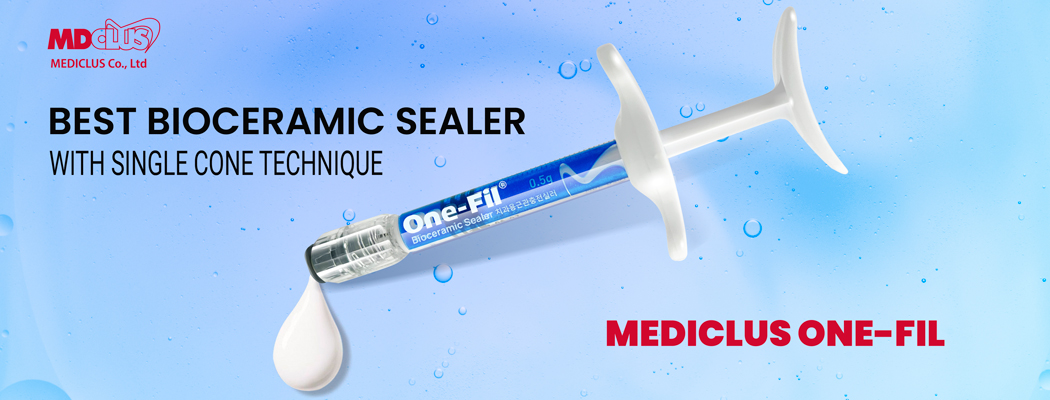Mediclus Onefil Bioceramic Sealer is an endodontic root canal sealer that is used to fill and seal the root canal system. It is made of bioceramic materials, which have a number of advantages over standard root canal sealers.
One of the main advantages of the Mediclus One-fil Bioceramic Sealer is its capacity to induce biomineralization, which can aid in the formation of a strong link between the sealer and the tooth structure. The process through which life forms create minerals to strengthen and heal tissues is known as biomineralization. Biomineralization can help to improve the root structure and lower the risk of fracture or other complications during endodontic therapy.
Antimicrobial characteristics are another advantage of Mediclus Onefil Bioceramic Sealer. The bioceramic materials used in the sealer have been demonstrated to have a high antibacterial effect, which can help to reduce infection risk and improve long-term treatment success.
Overall, the Mediclus Onefil Bioceramic Sealer is a potential endodontic treatment alternative with a number of advantages over standard root canal sealers. Nonetheless, it should be utilised in compliance with established protocols and recommendations, just like any other dental material, to achieve the best potential outcomes for patients.
HYDRATION MECHANISMS:
- When calcium silicate is combined with H2O (water), it produces calcium alumino silicate (C-A-H GEL) and calcium silicate hydrate (C-S-H GEL), and the high pH (pH 13.2) kills germs in the root canal.
- According to ISO 6876:2012 (100% humidity condition), the setting duration is 30 minutes. Yet, a standard root canal takes 2.5 hours.
- As a result, One-Fil is a CALCIUM SILICATE-based bioceramic root canal sealer that creates an ideal biocompatible environment in the root canal. As a bio-ceramic sealer, it offers exceptional sealing capabilities.
Different types of sealer in market:
There are several types of endodontic sealers available for use in root canal treatment. Some of the most common types of sealers include:
- Zinc oxide-eugenol (ZOE) sealer: Made from zinc oxide powder and eugenol, this type of sealer has been used for many years. It has strong sealing ability and is simple to use, but it has certain limitations, including poor dentin adhesion and sensitivity to disintegration in the presence of moisture.
- Resin-Based Sealers: Resin-based sealers are made of epoxy or methacrylate resins and are intended to adhere to the dentin and gutta-percha. They seal well and are resistant to disintegration in the presence of moisture. They may, however, be difficult to remove if retreatment is required.
- Calcium Hydroxide Sealers: Calcium Hydroxide Sealers are made of calcium hydroxide powder that has been combined with water or glycerin. They have high antibacterial qualities and can induce the creation of new dentin, but they have weak dentin adherence and may dissolve with time.
- Silicone-Based Sealers: Silicone-based sealers have good flow qualities and low solubility since they are made up of silicone oil and filler particles. They are easy to work with and seal effectively, however they may not attach well to dentin and gutta-percha.
- Bioceramic Sealers: Bioceramic Sealers are a newer form of sealer that is made up of calcium silicates and other mineral oxides. They have good sealing qualities, antimicrobial capabilities, and the potential to induce dentin development. They are also radiopaque and biocompatible. Overall, each form of sealer has advantages and disadvantages, and the choice of sealer will be determined by the patient's individual demands and the clinical scenario.
Benefits of Bioceramic Sealer:
Bioceramic sealers are a relatively new form of endodontic sealer that has grown in popularity in recent years due to its distinct features.
Some of the key features of bioceramic sealers include:
- Biocompatibility: Bioceramic sealers are biocompatible, which means they are non-toxic and do not irritate bodily tissues. As a result, they are a safe option for use in endodontic operations.
- Antibacterial Qualities: Antibacterial properties have been discovered in bioceramic sealers, which aid in the prevention of root canal reinfection. Hydrophilicity: Bioceramic sealers have a high affinity for water, allowing them to develop a strong bind with the root canal dentin walls. Biomineralization: Bioceramic sealers can promote the development of hydroxyapatite, a mineral found in natural tooth structure. This can aid in the strengthening and reinforcement of the tooth structure.
- Radiopacity: Bioceramic sealer are radiopaque, which means they can be seen on dental x-rays. This enables the dentist to precisely put the sealer during the process. Overall, bioceramic sealers outperform standard sealers in terms of biocompatibility, antimicrobial characteristics, and the potential to stimulate the development of hydroxyapatite. These characteristics make them an appealing candidate for use in endodontic operations.










